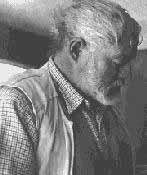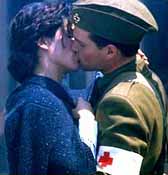Agnes von Kurowsky to Ernest Hemingway

Serving as an ambulance driver in Italy during World War I, an eighteen-year old Ernest Hemingway was taken to a Milan hospital after an explosion badly injured his leg. In that hospital he met one of the great loves of his life - Agnes Hannah von Kurowsky, a twenty-six year old American nurse who cared for Hemingway as he recuperated. Hemingway was infatuated with von Kurowsky from the start, and for a time she seemed to have feelings for him as well, though von Kurowsky later said she merely "liked" him and that their relationship was nothing more than a "flirtation." Hemingway wanted them to get married, but von Kurowsky - because of the age difference, her belief that Hemingway was immature and aimless, and her interest in other men - rejected the idea. In January 1919 Hemingway left the hospital but continued to write her. Von Kurowsky decided she finally had to convince him it was over, and on March 7, 1919, she wrote Hemingway the following letter.
Ernie, dear boy,
I am writing this late at night after a long think by myself, & I am afraid it is going to hurt you, but, I'm sure it won't harm you permanently.
For quite awhile before you left, I was trying to convince myself it was a real love-affair, because, we always seemed to disagree, & then arguments always wore me out so that I finally gave in to keep you from doing something desperate.
Now, after a couple of months away from you, I know that I am still very fond of you, but, it is more as a mother than as a sweetheart. It's alright to say I'm a Kid, but, I'm not, & I'm getting less & less so every day.
So, Kid (still Kid to me, & always will be) can you forgive me some day for unwittingly deceiving you? You know I'm not really bad, & don't mean to do wrong, & now I realize it was my fault in the beginning that you cared for me, & regret it from the bottom of my heart. But, I am now & always will be too old, & that's the truth, & I can't get away from the fact that you're just a boy - a kid.
I somehow feel that some day I'll have reason to be proud of you, but, dear boy, I can't wait for that day, & it was wrong to hurry a career.
I tried hard to make you understand a bit of what I was thinking on that trip from Padua to Milan, but, you acted like a spoiled child, & I couldn't keep on hurting you. Now, I only have the courage because I'm far away.
Then - & believe me when I say this is sudden for me, too - I expect to be married soon. And I hope & pray that after you thought things out, you'll be able to forgive me & start a wonderful career & show what a man you really are.
Ever admiringly & fondly,
Your friend,
Aggie
Hemingway's response to this letter is not know because one of von Kurowsky's boyfriends burned all of his letters. But in a June 1919 letter to his friend Howell Jenkins, Hemingway wrote: "I loved her once and then she gypped me. And I don't blame her. But I set out to cauterize out her memory and I burnt it out with a course of booze and other women and now it's gone." But not gone entirely - Agnes von Kurowsky became the basis for Catherine Bakley, the beautiful young American nurse who treats and falls in love with an American soldier in an Italian hospital in Hemingway's 1929 classic A Farewell to Arms." Who can say whether Kurowsky was instrumental in driving Hemingway to disillusionment and drink or if in a moment of remarkable lucidity she saw that he would have made naturally have made a poor husband? It is of course impossible to know; but I have thought much on this question and suspect it was probably equal parts both factors.
At any rate, Hemingway continued on to become a globally recognized world-traveler and adventurer as well as arguably the best writer of his generation; his prose cast a shadow over all the rest of 20th century American writers, whether in agreement with it or in opposition to it. Yet his great success as an author seemed to highlight the many failures in his personal life: Hemingway suffered through a number of disastrous marriages and divorces and proved unable to sustain lasting friendships. Suffering from alcohol-related illnesses and living alone late in life, Hemingway sought treatment for depression and paranoia. On July 2, 1961, he shot himself in the head with a shotgun. Although I am not sure as to the complete accuracy of the final paragraph of Paul Johnson's chapter on Hemingway from his book Intellectuals (how could anyone possibly know so intimately what was going on in Hemingway's mind at the time?), the last sentence is food for thought for all those attracted to the life of the mind:
"Why did Hemingway long for death? It is by no means unusual among writers. His contemporary Evelyn Waugh, a writer in English of comparable stature during this period, likewise longer for death. But Waugh was not an intellectual: he did not think he could refashion the rule of life out of his own head but submitted to the traditional discipline of his church, dying of natural causes five years later. Hemingway created his own code, based on honour, truth, loyalty. He failed it on all three counts, and it failed him. More seriously, perhaps, he felt he was failing his art. Hemingway had many grievous fault but there was one thing he did not lack: artistic integrity. It shines like a beacon through his whole life. He set himself the task of creating a new way of writing English, and fiction, and he succeeded. It was one of the salient events in the history of our language and is now an inescapable part of it. He devoted to this task immense resources of creative skill, energy and patience. That in itself was difficult. But far more difficult, as he discovered, was to maintain the high creative standards he had set for himself. This became apparent to him in the mid-1930s, and added to his habitual depression. From then on his few successful stories were aberrations in a long downward slide. If Hemingway had been less of an artist, it might not have mattered to him as a man; he would simply have written and published inferior novels, as many writers do. But he knew when he wrote below his best, and the knowledge was intolerable to him. He sought the help of alcohol, even in working hours. He was first observed with a drink, a 'Rum St James', in front of him while writing in the 1920s. This custom, rare at first, became intermittent, then invariable. By the 1940s, he was said to wake at 4.30am, 'usually starts drinking right away and writes standing up, with a pencil in one hand and a drink in another'. The effect on his work was exactly as might be expected, disastrous. An experienced editor can always tell when a piece of writing has been produced with the aid of alcohol, however gifted the author may be. Hemingway began to produce large quantities of unpublishable material, or material he felt did not reach the minimum standard he set himself. Some was published nonetheless, and was seen to be inferior, even a parody of his earlier work. There were one or two exceptions, notably The Old Man and the Sea, though there was an element of self-parody in that too. But the general level was low, and falling, and Hemingway's awareness of his inability to recapture his genius, let alone develop it, accelerated the spinning circle of depression and drink. He was a man killed by his art, and his life holds a lesson all intellectuals need to learn: that art is not enough."
Ernest "Papa" Hemingway
(1899-suicide 1961)"He was a man killed by his art, and his life holds a lesson
all intellectuals need to learn: that art is not enough."
"AN ELEGY FOR ERNEST HEMINGWAY"
by Thomas Merton
Now for the first time on the night of your deathyour name is mentioned in convents, ne cadas in obscurum.
Now with a true bell your story becomes final. Now
men in monasteries, men of requiems, familiar with
the dead, include you in their offices.
You stand anonymous among thousands, waiting in
the dark at great stations on the edge of countries
known to prayer alone, where fires are not merciless,
we hope, and not without end.
You pass briefly through our midst. Your books and
writing have not been consulted. Our prayers are
pro defunto N.
Yet some look up, as though among a crowd of prisoners
or displaced persons, they recognized a friend
once known in a far country. For these the sun also
rose after a forgotton war upon an idiom you made
great. They have not forgotten you. In their silence
you are still famous, no ritual shade.
How slowly this bell tolls in a monastery tower for a
whole age, and for the quick death of an unready
dynasty, and for that brave illusion: the adventurous
self?
For with one shot the whole hunt is ended!

 Back
to Ernest "Papa" Heminway Page
Back
to Ernest "Papa" Heminway Page 